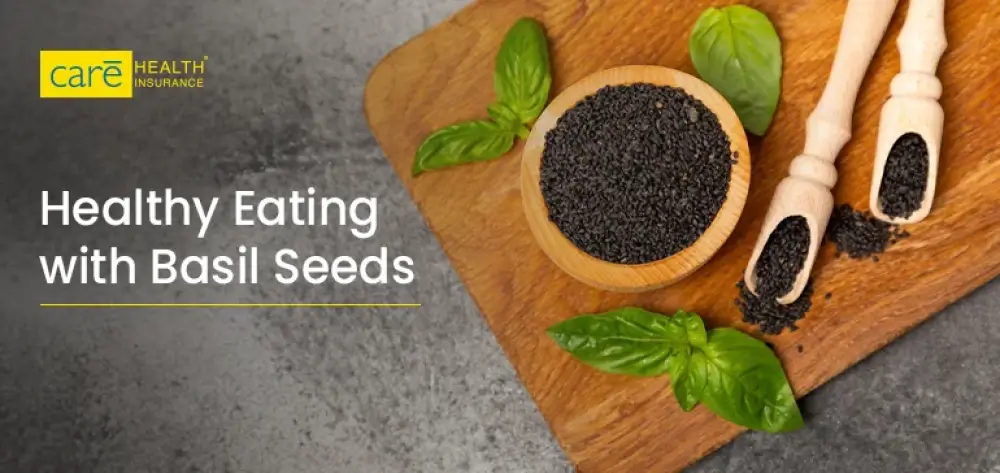We have all heard about the health benefits of basil plants, but did you know that basil seeds also offer incredible nutritional and therapeutic value?
Packed with the goodness of plant-based protein, fiber, and essential minerals, these tiny black seeds can do wonders for your health. In this blog, we’ll explore what basil seeds are, their nutritional composition, health benefits, how to prepare them and safety tips.
What are Basil Seeds?
Also known as sabja or tukmaria, basil seeds are tiny black seeds that originate from the sweet basil plant. They are rich in fiber, omega-3 fatty acids, essential minerals, and antioxidants and are used for both culinary and planting purposes.
In their dry state, they remain small and hard. However , when soaked in water for about 15 to 20 minutes, they swell and form a translucent, jelly-like coating with a crispy texture.
Nutritional Value of Basil Seeds
Being rich in nutrients, antioxidants, and fibre, basil seeds offer a balanced mix of plant-based protein, healthy fats, and carbohydrates. The below table shows nutritional value of basil seeds per 100g
Top Health Benefits of Basil Seeds
Here are health benefits of basil seeds:
Digestive Aid
When soaked in water, basil seeds form a gel-like mucilage due to their high soluble fiber. This gel helps to soften stools and add bulk, promoting regular bowel movements. The mucilage also soothes the intestinal lining, relieving constipation and preventing bloating and acidity.
Helps in Weight Management
Basil seeds are ideal for weight management due to their high soluble fiber content. When they are soaked in water, the fiber turns into a gel, causing a feeling of fullness. They’re also low in calories. Even if you eat them, they don’t add a lot of extra calories to your diet and help you feel full for a long time.
Supports Heart Health
Basil seeds are rich in alpha-linolenic acid (ALA), a plant-based omega-3 fat. ALA helps in reducing LDL (“bad”) cholesterol and reduces blood pressure, which improves cardiovascular function. They also contain antioxidant polyphenols and flavonoids that have anti-inflammatory effects. These combined effects contribute to reducing the risk of heart diseases.
Regulates Blood Sugar Levels
When you eat soaked basil seeds, the soluble fiber content in them forms a gel in your gut. This gel slows down the process of breaking down carbohydrates and stomach emptying, resulting in gradual entry of glucose in the bloodstream. This slow absorption helps maintain more stable blood sugar levels after meals.
Promotes Health Skin and Hair Growth
The antioxidants and flavonoids present in the basil seeds help fight oxidative stress and inflammation in the skin. On the other hand, the iron, protein, vitamin K, magnesium, and essential fatty acids present in basil seeds help in scalp nourishment, strengthen hair follicles, reduce hair fall, and promote hair growth.
How to Prepare Basil Seeds?
To prepare basil seeds for consumption, soak them in water for 15 to 30 minutes, until they swell and develop a gelatinous coating. Here’s the step-by-step process to prepare them:
- Clean the seeds: Carefully pick through the dry seeds to remove any potential debris or small stones.
- Add Water: Place the required amount of basil seeds in a bowl or glass. Use about one cup of water for every tablespoon of seeds.
- Soak: Let the seeds soak in water for about 15 to 30 minutes. They will absorb the water, swell to about twice their size, and form a gray gel-like film around each black seed.
- Strain: If there’s excess water remaining after the seeds have fully plumped up, strain it using a fine strainer.
How to Include Basil Seeds in Your Diet?
Here are some ways to include basil seeds in your diet:
- Shakes and Smoothies
Add a fibre boost to your smoothies, milkshakes or protein shakes by adding soaked basil seeds. They add a slightly chewy texture without changing the taste.
- Add to Yogurt, Puddings & Desserts
Stir soaked basil seeds into yogurt, overnight oats, or soy or almond milk-based puddings. The thick texture of basil seeds works well in desserts like falooda or chia-style puddings.
- Use in Savoury Dishes
Enhance the taste of your routine salads by sprinkling basil seeds in them. You can also try mixing them into dips and dressings.
- Baking & Egg Replacement
Natural binding properties of basil seeds make them a great vegan alternative to eggs in many baking recipes.
Side Effects of Basil Seeds
While basil seeds offer several health benefits, they might also pose risks when consumed in excess or without proper preparation. Understanding these side effects will help you ensure safe, mindful and effective use of basil seeds in your diet.
- Bloating and digestive discomfort
- Might cause lower blood sugar levels
- Allergic reactions like nausea, itching or throat infection
- Consuming dry basil seeds can cause a choking hazard
>> Read More: Unlock the Secret of Good Health with 10 Benefits of Chia Seeds
Why Does Basil Seeds Deserve a Place in Your Daily Diet?
Basil seeds may be tiny, but their nutritional value is unbeatable. From supporting digestion and weight management to improving heart health, blood sugar levels, skin glow, and hair strength, they offer numerous health benefits when consumed correctly. You can add them to your smoothies and milkshakes, savoury dishes, and yogurt.
However, with any nutrient-rich food, mindful consumption is necessary. Soaking the seeds properly before eating them and staying mindful about the side effects ensures that you utilise their benefits safely. While these seeds support health, unexpected situations can still arise.
This emphasises the need for the right health insurance plan. It provides financial safety during medical emergencies, covers hospitalisation and ensures access to quality healthcare.
Disclaimer: The above information is for reference purposes only. Kindly consult your general physician for verified medical advice
